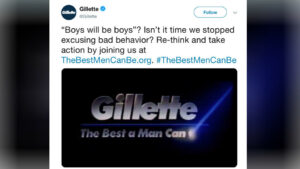Brands, ethics and controversy: Gillette, Nike and Greggs
There has been a lot of hot air surrounding recent advertising controversies – but, beyond the guff, there might also be valuable lessons for employers.
In the wake of #metoo and TimesUp, we have seen an increase in advertising campaigns focused on supporting progressive social change. The release of Gillette’s latest advert followed in the footsteps of Nike’s 2018 campaign faced by Colin Kaepernick: “Believe in something. Even if it means sacrificing everything.” Nike’s ‘sacrifice’ amounted to increasing its value by $6bn, with sales surging 31% after running the advert. At the time, we asserted that “brands need to attract young consumers in order to survive, and if ethical concerns are driving young people’s behaviour, brands would be foolish not to cater to them.”

The outrage expressed by some consumers through the hashtag #BoycottGillette on Twitter is a marketing technique in itself, giving Gillette free advertising and positioning itself at the centre of progressive conversations. Piers Morgan’s reaction to Greggs’ vegan sausage roll made its addition to Greggs line up a front-page story, and subsequently led to them selling out. The humble pastries then popped up on eBay, selling for a measly £40. Maybe the disdain of Piers Morgan is enough to give any brand a face lift.
Key to these campaigns is that the product is not at the centre of the conversation or the advertising: the brand is. They all build on the idea that it is good to be associated with the brand – just as Apple’s 2005 “I’m a Mac” campaign formed a notion of how the brand reflected the self-perceptions and personalities of their customers.

But are the statements made by brands in these campaigns heartfelt or just for show? Nike has a whole section on its website detailing their community impact plans across the globe, including programmes helping refugees.
Not only does charitable giving promote the brand with customers, it is also proven to attract and retain talent. A 2016 Deloitte report found that employees who participate in workplace volunteering are “more likely to be proud, loyal and satisfied employees.” Research by LinkedIn revealed that 46% of employees want to have a positive impact on society through their work, while 71% would take a pay cut to work somewhere which aligned to their values.
So the lesson for employers is clear: create a brand association that your employees – as well as customers – can buy into, and make sure that you actively promote that positive brand purpose.
It is reasonable to expect that in 2019 we will see more brands basing their brand identity and advertising campaigns around ethical issues, in order to both cause a social media stir. But it will only have meaningful impact for the business if the brand is seen to live up to its professed aims.
Josephine Kemp
Martin Tripp Associates is a London-based executive search consultancy. While we are best-known for our work across the media, information, technology, communications and entertainment sectors, we have also worked with some of the world’s biggest brands on challenging senior positions. Feel free to contact us to discuss any of the issues raised in this blog.